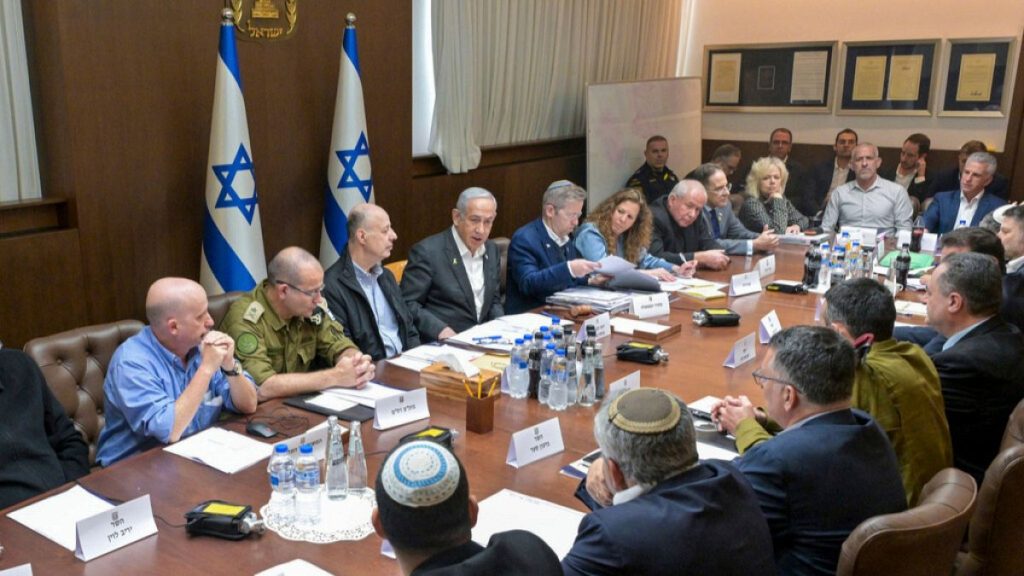The prospective ceasefire deal between Israel and Hamas, aimed at halting the ongoing conflict in Gaza, has been recommended for approval by Israel’s security cabinet, marking a significant step towards ending the weeks of violence. The deal involves a complex exchange: Hamas will release dozens of hostages, including foreign nationals and dual citizens, currently held captive in Gaza, while Israel will reciprocate by releasing a number of Palestinian prisoners held in Israeli prisons. This exchange represents a delicate balance of interests, addressing humanitarian concerns regarding the hostages’ well-being while also navigating the politically sensitive issue of prisoner releases. The security cabinet’s endorsement, following a period of delays and intense negotiations, paves the way for the full cabinet to provide the final authorization needed to implement the agreement.
The journey towards this potential ceasefire has been fraught with obstacles and delays, raising concerns that last-minute disagreements could unravel the fragile agreement. The initial target date for implementing the ceasefire had to be postponed, largely due to the complexities of the negotiations and the need to secure agreement from all parties involved. A key point of contention revolved around the precise details of the prisoner exchange, with both sides engaging in intense discussions to finalize the list of individuals to be released. Furthermore, the sensitive nature of the negotiations, involving the release of individuals deemed security threats by both sides, required careful consideration and meticulous planning to ensure the safe and coordinated transfer of the hostages and prisoners.
Internal political dynamics within Israel also contributed to the delays and challenges in reaching a ceasefire agreement. Prime Minister Benjamin Netanyahu faced considerable opposition from hard-line members within his own coalition government, who expressed strong reservations about the proposed deal. These members argued that releasing Palestinian prisoners, particularly those with a history of violence against Israel, would be a concession to terrorism and potentially embolden Hamas and other militant groups. They argued that such a move would reward Hamas for taking hostages and encourage future acts of violence. The threat of resignations from these hard-line members placed added pressure on Netanyahu as he sought to balance the imperative of securing a ceasefire with maintaining the stability of his government.
The approval by the security cabinet, despite internal opposition, underscores the urgency of halting the violence in Gaza and addressing the humanitarian crisis unfolding in the region. The protracted conflict has resulted in significant loss of life, widespread destruction of infrastructure, and immense suffering for the civilian population. The ceasefire offers a glimmer of hope for a respite from the hostilities and an opportunity for humanitarian aid to reach those in desperate need. It also represents a potential turning point in the broader Israeli-Palestinian conflict, offering a chance to de-escalate tensions and explore avenues for a more sustainable peace.
The next crucial step is the full cabinet’s final signoff on the agreement, which is anticipated to clear the path for the ceasefire to take effect. The timetable for implementation envisions the initial release of hostages occurring on Sunday, marking a tangible step towards fulfilling the terms of the agreement. While the Israeli high court is scheduled to hear petitions challenging certain aspects of the deal, it is widely expected that the court will not intervene and allow the ceasefire process to proceed. This anticipation stems from the understanding that the court is generally reluctant to interfere in matters of national security, particularly in situations involving delicate negotiations with hostile entities.
The potential ceasefire, while a significant development, represents a fragile and tentative step towards resolving the complex and deep-rooted conflict between Israel and Hamas. Numerous challenges remain, including ensuring the full implementation of the agreement, addressing the underlying causes of the conflict, and building trust between the parties. The international community will play a critical role in supporting the ceasefire, providing humanitarian assistance, and facilitating dialogue aimed at achieving a lasting peace in the region. The coming days and weeks will be crucial in determining whether this fragile ceasefire can hold and pave the way for a more peaceful future.














